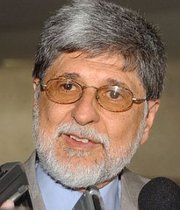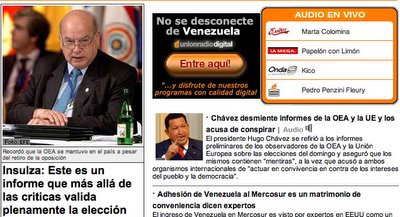Well, I'm on my way back to Europe now, and I thought I'd write one last WTO post to bring together some of my thoughts about the week. I guess it's the first time I ever blog from a plane - brace yourselves, folks: I have a 13 hour flight ahead of me, so this one is going to be loooooong...
Yesterday's agreement left a lot of people feeling like the ministerial was a big waste of time.
The Economist called it
"little more than an expensive experiment in sleep deprivation." Even Pascal Lamy, the WTO Director General, accepted how modest progress has been: coming into Hong Kong, he said, the WTO had completed 55% of the work on the Doha Round, and after last week,
"it's up to 60%." (Never mind that just two months ago Hong Kong was being billed as the meeting that would settle 99% of the round.)
In the end, Hong Kongers saw traffic go all haywire for an entire week and big chunks of their city trashed by protesters for the sake of
a deal that only highlights its own shortcomings.While the deal itself may be more like a symptom than a cure, it's also true that, diplomatically, all the big players walked away with at least some of what they wanted...
Pascal Lamy got what he wanted: even though the organization can't actually agree on any fundamental issues, the headline from the ministerial was still "WTO reaches agreement." This is important: the WTO's viability as an international organization was very much in the spotlight in Hong Kong, and the pressure to agree on
something was immense. Lamy couldn't afford another spectacle like the one they had in Cancun, with incandescently pissed-off LDC ministers walking out left and right. To his credit, Lamy did not try to force a consensus on the developing countries - the tactic that created so much bad blood in Cancun - and instead
let the delegations themselves build up an agreement. As a result, though the Doha Round is surely still on life support, it's not quite dead.
Brazil got what it wanted: the long-standing dream of consolidating a no-bullshit developing country block at the WTO - preferably under Brazilian leadership - was finally realized. In fact, the Brazilians did even better than that: they managed to rope in some
developed countries - Canada, Australia and New Zealand - into their sprawling, 110-country coalition as well. Though it has a smaller, less dynamic, and slower-growing economy than India, Brazil managed to appoint itself tacit boss of a negotiating block that accounts for 80% of the world's population spread over five continents, from Vanuatu to Cameroon to Indonesia to Mexico to Uzbekistan. Amazingly, though they have very very different interests, the group held together. However crappy the ultimate deal, the summit was a very significant victory for Lula's diplomacy.
The West African Cotton Producers got what they wanted: a deal to end US export subsidies next year, and, in principle, for the US to cut domestic cotton subsidies faster than it cuts other agricultural subsidies (once such cuts are agreed - supposedly by the end of April.) The deal is incomplete - the language on cutting domestic cotton subsidies is vague and non-committal - but still, for four of the weakest, poorest, least powerful countries on earth to wrangle any concessions at all out of the Americans at a WTO negotiation is totally unprecedented - and, again, a testament to the value of Brazilian diplomacy, which put the 110-member developing country group squarely behind the West Africans' demands.
Alas,
the EU also got what it wanted: permission to keep screwing African farmers for another seven years. Disgusting though I find it, I have to chalk it up as a success for them. The EU showed conclusively that intransigence and brinksmanship pay off in these negotiations. By holding out until the very, very last minute, they got a deal on agricultural export subsidies so weak it's hard to know what it even means.
It's not just that they extended the use of export subsidies for another seven long years, oh no. Though it hasn't gotten much press, it's also that the EU's commitment to end agricultural export subsidies is
conditional - they'll only deliver if the US reforms its food aid program (which the EU sees as a disguised export subsidy) and Australia, Canada and New Zealand end their state marketing monopolies (e.g. the Canadian Wheat Board.) So it's more than the glacial pace of the phase-out, it's that they left the door open to come back and say "no fair! the US didn't reform its food aid enough, we're going back on the deal!" Ugh!
Finally,
the US got what it wanted: positioning itself as the
"honest partner" for the developing countries that the Europeans will not be: the kinder, gentler economic power at the WTO. The contrast between Portman's relative flexibility and the utter rigidity in Mandelson's position was impossible to miss. And the softly-softly approach got the US some negotiating outcomes they may not otherwise have achieved.
For one thing, the Hong Kong Declaration approved the
"Swiss Formula" as the method for cutting industrial tariffs. It gets very technical very quickly, I realize, but the Swiss Formula is a mathematical formula designed to cut higher tariffs more than lower tariffs, leaving tariffs both lower and less dispersed than they started. (Everything you ever wanted to know about the Swiss Formula but were afraid to ask
is here.) The Swiss Formula has always been the US's preferred tariff-cutting method (though, in one of those bizarre little WTO asides, it turns out Switzerland doesn't like it!) The detail that the devil is in still has to be worked out, but the Swiss Formula is generally seen as a very aggressive tariff-cutting mechanism.
A lot of people in the lefty-NGO community are horrified about this - and there's no question that, if implemented aggressively, Swiss Formula tariff cuts can be brutal. Personally, I'm holding out to see the details. Whether this is good or bad for development depends on how many coefficients they agree to, and the actual coefficients they decide on. Since the coefficients were the really hairy part of the negotiation, they obviously couldn't agree on them.
I'll say one thing, though. For a long time, one of the major complaints of the antiglobalization crowd about the WTO has been
"peak tariffs" and
"tariff escalation." Peak tariffs are very high tariff lines applied to just a few selected products - like rice in Japan, which faces a 200% tariff, even though the average tariff in Japan is under 3%. Tariff escalation is the practice of applying higher tariffs to processed products than to raw materials. The classic example of this is cashew nuts produced in Mozambique: if you apply a tariff of 1% on raw cashews but a 30% tariff on roasted cashews, you obviously build in an incentive for Mozambique to export the raw nuts, rather than to roast them in Mozambique. That's bad news for Mozambique's cashew-roasters, and for poor countries' efforts to industrialize in general.
My point here is that the Swiss Formula is the best way to address both of these problems. Its whole point is to lessen the dispersion of final tariff rates. The Swiss Formula makes peak tariffs impossible and tariff escalation ineffective. Since developed countries will likely have to cut tariffs more aggressively than developing countries, there's at least a chance that the agreement will be development friendly. It all depends on the actual coefficients they settle on, and there's a very big fight looming over those in the months ahead. But personally I don't see how these Oxfam types can spend 10 years railing against peak tariffs and tariff escalation and then turn right around and slam the one proposal guaranteed to do away with them.
The other major point where the US got what it wanted was in the so-called
"Development Package" - the proposal to give the 32 poorest countries unrestricted access to rich country markets. During the negotiation, the least developed countries kept pushing for the deal to be made permanent, legally binding and to apply to all products coming from all least developed countries. On this issue, if on nothing else, the EU sided with the poor countries. But the US and Japan resisted it for two reasons: textiles and rice.
For the US, the big problem was with Bangladeshi textiles. Though classified as a Least Developed Country for WTO purposes, Bangladesh has become very, very competitive in the textile sector, and the US feared that an uncontrolled import surge from Bangladesh would put US clothes producers out of business. At one point, the US actually argued that, in the textile sector, Bangladesh is a developed country! (The Bangladeshi journalist who told me this tidbit couldn't control the sarcasm: "thank goodness that these Americans let us know about that: all those years I thought I was living in a really poor country and it turns out we were textile-developed all along!") Japan had similar concerns about Cambodian rice.
In the end, Japan and the US got their way: the final deal will give the poorest countries quota free/tariff free access to 97% of rich country markets, allowing rich countries to exempt 3% of their tariff lines. Moreover, the deal is described not as "binding" - meaning mandatory under international law - but as "lasting" - which is a legally meaningless word.
Still, that's something you might read about in the newspaper and think "dang...lasting agreement...97%...that's pretty good!" But, of course, LDC exports are concentrated in very few tariff lines. As the International Center for Trade and Sustainable Development - my favorite think-tank for WTO issues -
points out:This 3 percent reservation would account for some 330 tariff lines, according to Debapriya Bhattacharya, head of the Dhaka-based think tank, Centre for Policy Dialogue. "Given [LDCs'] undiversified export basket, 3 percent of tariff lines may essentially deprive them of market access for all of their products." He noted that 20-25 tariff lines account for some two-thirds of Bangladesh's total exports.
In other words, it's a big, big loophole. It brings to mind the quip from Deepak Patel, the Zambian trade minister who headed the G90 group of African, Caribbean and Pacific countries: "come on, folks, it doesn't do us any good at all to get tariff free market access for products we don't produce...a plan to give us tariff free access to the rich countries' supercomputer market is not very useful to us!"
There's just one thing to say about this aspect of the deal: it stinks. In fact, what they're doing is a long-standing gripe of poor country negotiators, and well-justified at that: "Developed countries keep telling us the WTO is good for us because it will allow us to trade our way out of poverty," they say, "ok, very good. So we start trading...but then, as soon as we start getting good at it, as soon as we find a market where we can really compete and export a lot, they freak out and start putting in loopholes to close those markets!" It's easy to see why Bangladesh feels it's being taken for a ride here.
Actually, as I think of it, the one country that seems to have gotten unambiguously screwed in Hong Kong is Bangladesh...
The big question, though, is whether the deal
"preserves the development content" of the Doha Development Round. As you'll have gathered, I think it's too early to tell. That's a question I won't be able to answer until there's a final deal on the table. Certainly, there are some positive aspects. On all the main areas of negotiation, rich countries will have to make stronger commitments than poor countries. Though the cotton deal is limited and the "development package" could be better, they do represent progress.
Probably my biggest gripe about the Doha Round is that
the agenda is all wrong. If developing countries wanted to undo some of the damage from the last round, they should've insisted that the TRIPs and TRIMs agreement be retrospectively weakened: those agreements really do place obstacles in the way of development strategies. They block some supply-side policies (like local content requirements, technology transfer provisions, and reverse engineering) that have helped most now-rich countries get rich. But TRIMs is off the agenda, and only very limited parts of TRIPs are being reviewed. On the other hand, the agenda could be worse: in Cancun the EU wanted to bring Investment and Government Procurement into the agenda - issues that would not have played in favor of developing countries. The meeting collapsed and the EU eventually gave up on that.
So, is this still a development round? In the end, I trust
Celso Amorim and
Kamal Nath more than I trust
Oxfam or
Action Aid. Developing country negotiators still seem to think that there's some "development content" to the round - and while they'd obviously hoped for more, they still think it's worth going forward with the round.
I do think it's awfully patronizing of the first world lefty NGOs to try to tell us they know what's in the poor countries' interests better than the poor countries' own ministers. It's true that the round will not produce some kind of dramatic sea-change in the trade regime, but then, it was never likely to. Developing country trade negotiators understood this, which is why they're cautiously welcoming the accord. Utopian by nature, campaigners were always bound to be disappointed by the grinding reality of a trade round.
So the negotiations will have to go ahead at WTO headquarters in Geneva over the next four months. Very obviously some significant compromises are needed to bridge the very wide gaps that remain between the various positions. Lamy acknowledged as much on Sunday, echoing something the Brazilians have been saying for months: trade ministers alone will not be able to save the Doha Round, heads of government will have to get involved. It's going to take a tete-a-tete between Bush, Chirac, Blair, Merkel, Lula and Manmohan Singh to bridge some of these gaps. In particular, the Europeans will need to face up to the fact that they can stonewall their way to a deal like the Hong Kong declaration, but that kind of tactic will not yield an overall agreement. In the big scheme of things they can have the Common Agricultural Policy as it currently stands or they can have a new Multilateral Trade Agreement...but they can't have both.
Well, if you've read this far - congratulations! You're procrastinating way more than usual|! Heh. OK. This time I really really really promise to stop ranting about the WTO.




